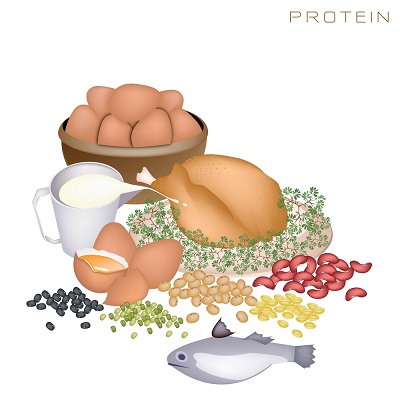 Protein can definitely help you to lose weight, but the interesting part is how it does so. Of the three macronutrients: protein, fat and carbohydrates, studies have shown that protein has the most effect on losing weight because of the four effects it has on the body:
Protein can definitely help you to lose weight, but the interesting part is how it does so. Of the three macronutrients: protein, fat and carbohydrates, studies have shown that protein has the most effect on losing weight because of the four effects it has on the body:
Hormone Production
When we eat, certain hormone levels in our body change. The level of Glucagon-Like Protein-1 (GLP-1), peptide YY and cholecystokinin increase, while the hormone indicating hunger ghrelin drops. The hypothalamus part of our brain senses these changes and based on the amount of change, tells us when we are full and to stop eating.
Protein seems to have a greater effect on satiety than does fat or carbohydrates, so our brain sends out the full signal quicker, thus naturally reducing the total number of calories consumed.
Thermic Effect
Once we are finished eating, a certain number of calories are burned up to break down and digest food. This is known as the thermic effect. Protein has a higher thermic effect than does fat or carbohydrates. Where 30% of the calories are used to breakdown protein, only 5-10% and 0-3% for carbs and fat, respectively are used. This equates to a net of 70 calories left for every 100 of protein consumed. The other 30 calories are used for digestion.
Metabolic Effect
Partly due to the thermic effect and partly to other factors, protein boosts the number of calories burned in a day by as much as 80 to 100 over what would otherwise have been burned with a lesser protein intake.
And, the increase in metabolism continues throughout the night while sleeping. The metabolic increase is one advantage diets high in protein have over other diets that are lower in protein.
Appetite Suppression Effect
Because protein takes longer to digest than fat or carbohydrates, a diet with 30% protein keeps one feeling fuller longer, thus reducing the temptation to snack between meals. Not only is the meal-to-meal calories reduced, but studies have shown the whole days’ worth of calories are reduced – by as much as 441 calories per day.
Because it takes a calorie deficit of 500 calories per day to lose a pound a week, eating a diet high in protein almost satisfies that deficit requirement alone. Add in some exercise to make up the difference.
Because a diet high in protein not only reduces the number of calories consumed, but also the number of calories burned, it is easy to see why losing weight on a high protein diet is realistic.
In one study, participants lost an average of 11 pounds over the 12-week study and the only change they made was adding protein to their diet. While individual results may not be as dramatic, weight loss is possible and should be expected with a high protein diet.






